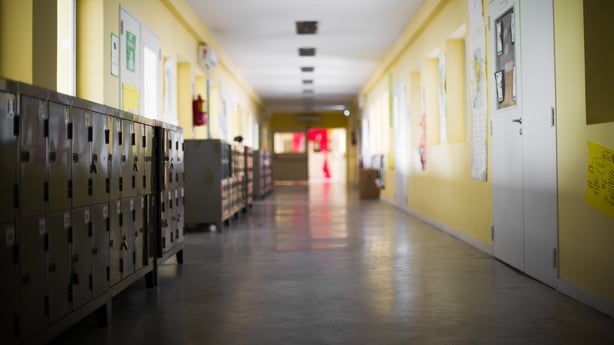On 12 August the Dublin Rape Crisis Centre (DRCC) opened applications for its next four-day training course, aimed at teachers and others who work with young people, on the meaning of consent and attitudes and behaviours around sexual violence.
There was no need to advertise because the course's 14 places were immediately filled, from the centre’s lengthy waiting list, which currently has almost 200 names on it.
There is huge demand from teachers and others for training in this sensitive area.
The SPHE curriculum includes Relationships and Sexuality Education.
Publishing the new syllabus, the department also announced that the subject is soon to become mandatory. But that last step has been delayed until 2027 largely because there are so few teachers who are adequately trained to deliver a subject that includes topics that are highly sensitive and complex.
Last year, SPHE became compulsory for Junior Cycle students.
Currently the subject is not mandatory at senior cycle and research by the National Council for Curriculum and Assessment shows that fewer than one in five schools timetable it for these older students on the cusp of adulthood.
At a time when teenagers - both older and younger - are facing the kind of pressures that their parents' generation can barely begin to understand, their need for new skills and knowledge to help them navigate the challenges they face has perhaps never been more pressing.
This is what the new SPHE curriculums aim to do.

In their components on Relationships and Sexuality education they aim to educate, in an age-appropriate way, on issues such as online safety and how to become critical consumers, a young person’s rights, including their right to give or withhold consent in physical relationships, pornography and its negative impact, domestic and gender-based or sexual violence, and how to recognise a relationship that is abusive.
The curriculums have been designed to be student-centred and teachers also need to be able to deal appropriately with concerns that students themselves may raise in class.
This week at Cork Educate Together Secondary School one of the topics that was discussed and examined in class was 'cancel culture'.
"Cancel culture is when if you do just one small thing you get 'cancelled' or ostracised.
"The whole year group could stop talking to them," SPHE teacher and guidance counsellor Pam O’Leary told RTÉ News.
Teaching is about listening, but it is also about leading, and Ms O'Leary led her class in a focused examination of what is called relational bullying.
Ms O'Leary said another "huge issue" of concern for teenagers and one that they are raising in the classroom is 'sextortion'.
This is when someone is blackmailed for explicit pictures online.
"Self-harm and its glamourisation online is another," she said.
"It is seen [by some teens] as something you can do to alleviate pain".
She talks about other issues students raise, that are even more serious still.
These are the kinds of toxic messages that teenagers are coming across online and that they need to be able to critically assess and combat.
But teachers need training in order to help them do so.
"There cannot be curriculum development without teacher development," Dr Kay Maunsell, Associate Professor of Psychology, Human Development and Education at Dublin City University (DCU) said.
Dr Maunsell is Chair of DCU's new Graduate Diploma in SPHE and Relationships and Sexuality Education.

Last January, the course’s first 34 students - all teachers - graduated. There are 42 students on the current course, and next year the intake will rise to 70.
This course is the first and only specialist qualification in the field here.
"It is in its very early stages," Dr Maunsell said.
"The course is about building [teachers'] confidence to address challenging issues and difficult questions, whatever they may be, so that they are better equipped in the classroom".
Funded by the Department of Education, she said that the new course is already having a really positive impact, with some of its graduates now going on to deliver some training to other teachers through the department's professional development arm, Oide.
But there is a lot more to be done, she added, and The DRCC agrees.
Its CEO Rachel Morrogh cites Central Statistics Office (CSO) data which finds that six out of ten young women aged between 18-24 say they have experienced sexual violence.
"Sexual violence is an extremely prevalent and extremely concerning issue that our children are facing.
"There is a toxicity online, the algorithms that we as a society have failed to address mean that children and young people who are not seeking it are being served content and they don’t have the tools to critically challenge what they are seeing".
Ms Murrogh said the centre is concerned that toxic misogynistic behaviour seen online may be "leaking out into the real world" with perpetrators acting out what they have seen online.
The goal of the DRCC four-day course is to give teachers and others the confidence to address such toxic messages and misconceptions with young people.
"There is a window of opportunity to get this right, teachers are really trying to seek out support for themselves and we need to ensure that educators are confident and comfortable [in delivering the new course]," Ms Morrogh said.
Ms O'Leary agrees, saying that teachers she knows are willing to teach the subject, but they are scared.
"They are scared of teaching topics such as pornography, gender, or abuse - and education on abuse is super important given our history and what we know now, it is just so, so, important.
"But they are very, very nervous about all this. They are afraid they may say the wrong thing, that a child [who may have experienced abuse] may be triggered, they are scared of parental opposition".
There is even a danger that a teacher could cause damage to a child if a sensitive topic is not addressed correctly.

Ms O'Leary was among the 34 students who were the first to complete DCU's new diploma in the subject.
"I found it amazing. It was the best training I ever did.
"It has made my teaching much more purposeful, and I feel a lot more confident".
She has huge praise for the new SPHE curriculum.
She points out that it was eight years in the making, and was the subject of an unprecedented level of consultation with parents, teachers, students and a wide range of education bodies.
"Teachers are naturally caring. They want to impart knowledge and skills.
"[The SPHE course] is an absolutely robust very comprehensive curriculum, but they are not trained in this area".
On the day of the Leaving Certificate results in August, I asked Padraig Flanagan - the principal of Castletroy college in Limerick who was retiring after 44 years in education - what he felt was the most pressing issue in education today.
He said the biggest change he had witnessed was the change in the role of the teacher.
"In days of old, teachers’ knowledge was all that mattered. Now, it is teachers’ care and support and empathy.
"In a very challenging world in more recent years, the care needs have outstripped the academic requirements".
Mr Flanagan said schools were "crying out" for supports.
Students are too.
The goals of the new SPHE curriculum are widely lauded, but delivery, and training for teachers, will be key.







